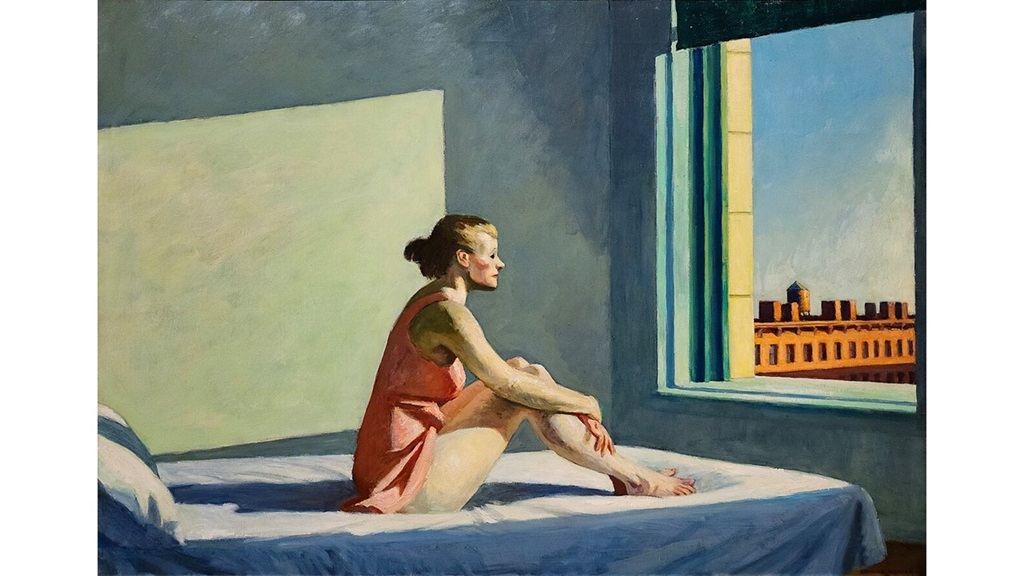.
Snapshot
It’s morning and you rise. You shake your hair
And stretch yourself a bit, your elbows high,
Your blue night gown illuminated by
A slant of light that smolders in the air.
I want to keep you here just as you are—
Your smiling face and hair confused just so,
Your two bare feet that step so lightly through
The sun’s pathway that cuts across the floor.
The floor is like a sun dial’s burning face
Now held completely open to the sun,
No eye to close or gaze to turn away.
The walls mere walls, blinds sieve the streaming day,
Yet day still comes, our burning time burns on.
How beautiful it is! This time, this place.
.
.
Steven Frattali worked in the field of mental health and currently lives in Greater Boston. In his former life as an academic, he published two short books: Person, Place and World: A Late Modern Reading of Robert Frost’s Poetry (English Literary Studies, 2002) and Hypodermic Light: Philip Lamantia and the Question of Surrealism (Peter Land, 2003). His book on Elizabeth Bishop is nearing completion along with another on John Wieners.















This sonnet has plenty to offer to its readers. A slice of life so beautifully presented. The “smouldering slant of light” already tells us it’s a bright morning; the lady’s illuminated gown and the pathway on the floor (I imagined it like a carpet of light) append to the type of day it is. The “sundial” simile is spot on, unique, and immediately adds to the existing delight of reading this piece. Line 13, according to me, can allude to two distinct things: a brief separation between the pair due to day jobs or a longer separation. The couple doesn’t want to go their ways and wishes time to freeze. A perfect sonnet describing love, passion, and the joy of being with someone who makes you feel alive. Thanks for sharing this, Steve. My heart is full.
Great sonnet, Steve. Seems to be a self-styled rhyme scheme, which I like.
You’ve done a great job putting your own spin on Hoppers ‘Morning Sun’, extending your interpretation beyond the picture itself, with some great rhymes and imagery. In particular, I liked the image of the floor as a sundial and the line ‘blinds sieve the streaming day, / Yet day still comes’. Classic!
I don’t know if you’ve deliberately injected ambiguity into the last sentence. For me ‘this time’, could mean ‘time’ itself, personified, or this instant of time, the ‘Snapshot’ that you’re describing.
Thanks for the read.
What an exquisite painting you’ve created with this poem! “Hair confused just so”; “Blinds sieve the streaming day” — wonderful imagery throughout.
A sonnet is a good shape for a snapshot. This one portrays, by image and statement, the longing to retain an instant that’s slipping away as the speaker looks at it. “The floor is like a sundial’s burning face” as “our burning time burns on.” Even the light effects that create the picture work to consume it (such as “a slant of light that smolders in the air”). This is one of those classic themes of love poetry, treated in a fresh way here.
What a lovely linguistic “snapshot” – this beautifully wrought sonnet burns with the beauty of the moment captured in tangible imagery that shines with a contagious joy. Thank you!
Morning Sun
by Red Was Iceblue
“an image of the meditative gazer’s mind
as the cast shadow on the bed of her body.”
—John Hollander
Impassively, and lost in thought, she faces morning sun.
The wall is bare, as is the bed on which she sits alone.
The room above the streets suggests the bleakness of her life.
Has she been modeled after Josephine, Ed Hopper’s wife?
The window frame, the building’s face, the sky and city view,
are all severe, so minimalist as to seem too true.
The isolation and the quietude are palpable,
as is the introspection, which is strangely graspable.
Red Was Iceblue is a poet of Modernist painting. Edward Hopper (1882-1967) was an American Modernist painter. John Hollander (1929-2013) was an American poet and art critic.
Morning Sun
by Red Was Iceblue
“an image of the meditative gazer’s mind
as the cast shadow on the bed of her body.”
—John Hollander
Impassively, and lost in thought, she faces morning sun.
The wall is bare, as is the bed on which she sits alone.
The room above the streets suggests the bleakness of her life.
Has she been modeled after Josephine, Ed Hopper’s wife?
The window frame, the building’s face, the sky and city view,
are all severe, so minimalist as to seem too true.
The isolation and the quietude are palpable,
as is the introspection, which is strangely graspable.
Red Was Iceblue is a poet of Modernist painting. Edward Hopper (1882-1967) was an American Modernist painter. John Hollander (1929-2013) was an American poet and art critic.